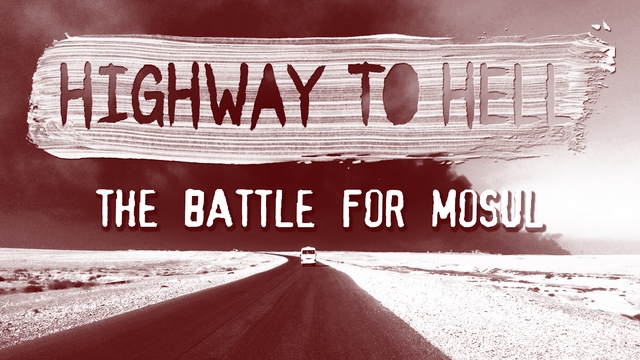Highway to Hell: The Battle for Mosul
On the front lines of the Battle for Mosul
 Across three trips to the front-line beginning last October, and under the echoes of snipers and shells, two film-makers tell the story of the Iraqi assault on Mosul: 'the biggest battle anywhere on the planet this century.' Through streets strewn with rubble and bodies, they meet soldiers fighting to liberate their homes and civilians caught in the crossfire. At the centre of IS power, the battle's result will have a huge impact on the future of IS and terrorism across the globe.
Across three trips to the front-line beginning last October, and under the echoes of snipers and shells, two film-makers tell the story of the Iraqi assault on Mosul: 'the biggest battle anywhere on the planet this century.' Through streets strewn with rubble and bodies, they meet soldiers fighting to liberate their homes and civilians caught in the crossfire. At the centre of IS power, the battle's result will have a huge impact on the future of IS and terrorism across the globe.
The din of heavy weapons greets reporter Matt Brown as he approaches the front-line, where it is clear that there is no frontier between civilian and combat zones: "That's rocket fire. We're getting very close now to the frontline. There are civilians here, plenty of them, but this is obviously an active combat zone." The combined forces soon locate an ISIS target and call a helicopter for support: "a full blown firefight erupts…civilians still live here but it's an unrelenting attack." The pale building in which fighters and possibly citizens were taking refuge is engulfed in a torrent of missile and machine gun fire.
Brown soon witnesses how such military actions can have shocking effects on innocent lives. Dr Fathi is arranging care for two children hit by a mortar. Medical help is almost entirely absent: "There are no doctors in our region. The family asked me to bring him in the car and I brought him here." With medical assistance in such a state, the young injured boy lies on the floor next to his dead sister, until they are both put in to the back of a truck, "the dead on top of the living."
Yet among the carnage and death there is still some hope. Firas, a Kurdish fighter, has been attempting to liberate his home and save his mother. Thanks to him, his mother is now in safety, able to take joy in her son's visits and reflect on the cost of survival: "Yes, there was fear. We were all psychologically disturbed. We were scared. Thanks to God now it's like paradise."
However, there are deeper divides that will persist after the rockets have stopped: "the local Sunni population harbours long standing grievances against the Shiite dominated army. We see signs of that bitter divide when a soldier shouts 'we are Shia' and shoots over the head of a fleeing child."
As Brown drives out of Mosul he reflects on a conflict that will only get worse before it gets better, reminding us of all the people that are still trapped. "So many people in need of hope. So many reasons to fear the worst."
FULL SYNOPSIS



